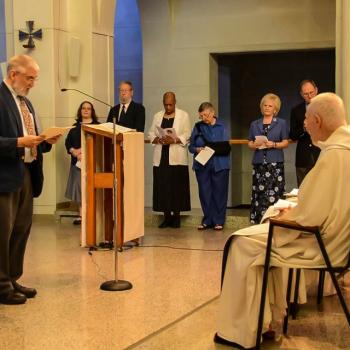This thought came to me yesterday. We Christians understand spirituality and mysticism in communal ways: we are knit into the Body of Christ, our mandate is to love one another, we are to “be Christ” for each other, and so forth. For this reason, intercessory prayer — praying on behalf of others — is an important part of Christian spirituality. Indeed, in Catholicism it is customary to make offerings to the church to have masses said for the intentions of those we love.
Meditation and contemplation are often seen as spiritual practices with an essentially self-oriented purpose: I meditate in order to achieve enlightenment, or in order to heighten my consciousness, or in order to find greater peace and inner serenity, or perhaps even just to feel more intimate and connected with God. These are all good things. But they are all also essentially self-directed things: it’s all about me, or maybe me & God, or at best, God & me. Meditation and contemplation always seem to collapse back into what Plotinus called “the flight of the alone to the Alone.”
But what if we who meditate and contemplate in a specifically Christian context began to think about our silence in a more communal way? What if we entered into silence not for our personal benefit, but for grace and blessing on behalf of others? What if, just as when a priest says a mass for a particular person’s or family’s or group’s intentions, we did the same thing for our time spent in contemplation? What if my intention for contemplation was less about my growth/peace/enlightenment/God-connection, and more driven by a yearning that those blessings would be showered on others — on those I love, or perhaps even on those who have no one to pray for them, or maybe even for the entire world?
In other words, what if I, spiritually speaking, just gave away whatever merit or blessing awaited me as a result of my meditation? “I enter into this silence, God, seeking nothing for myself but only that you will shower your blessing on those who need it the most.” This would be, in effect, intercessory contemplation. Just as a bodhisattva declines his or her own ability to enter enlightenment out of a desire to serve others, so the intercessory contemplative will engage in his or her practice not for personal gain (or not for personal gain alone), but as a way of humbly beseeching God to transform the lives of others.
Here’s how I described it on Twitter yesterday, using the economy of words necessitated by Twitter’s character limits:
“Intercessory Contemplation”: entering into silence as a
sacrificial act of love for our neighbors and the world.
That pretty much sums it up.
Enjoy reading this blog?
Click here to become a patron.


















